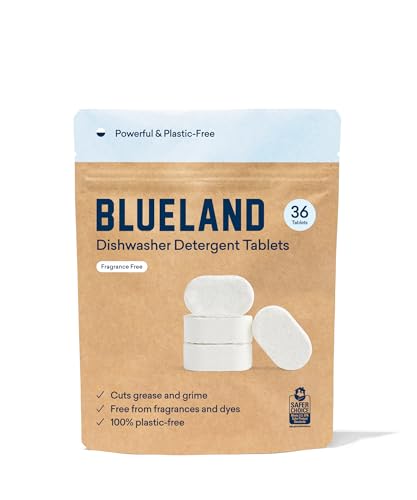
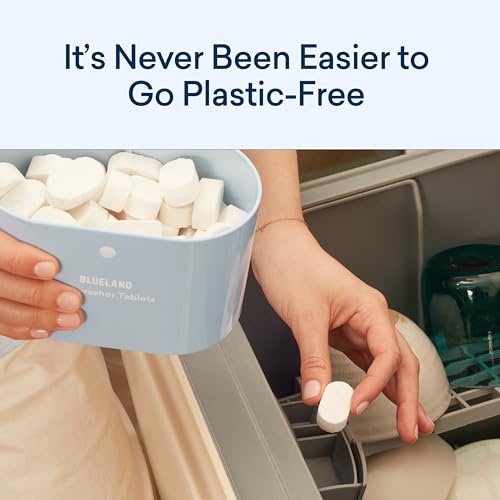
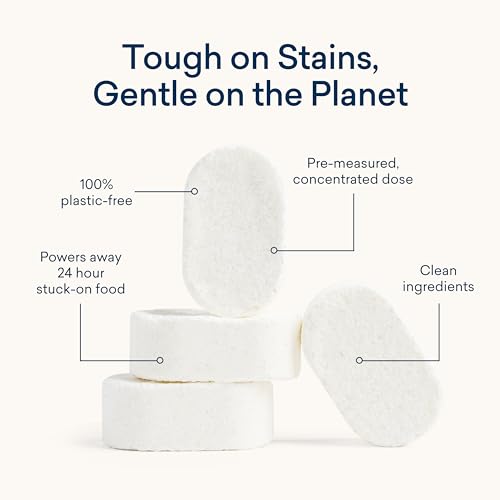
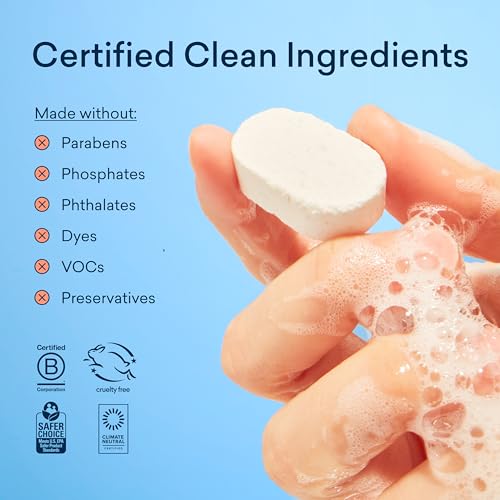
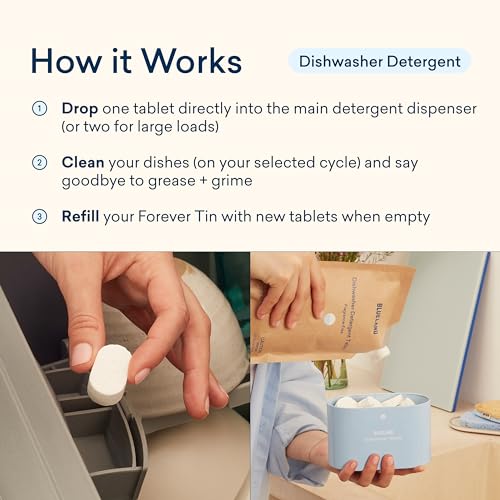
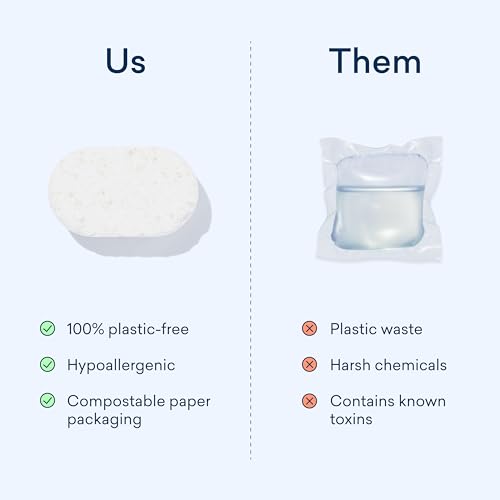
BLUELAND Dishwasher Detergent Tablets - Tough on Stains, Plant-Based, 36 Count


Subtilisin
Medium RiskSubtilisin is an enzyme obtained by fermentation of certain bacteria, primarily used in cleaning products and detergents for its ability to break down proteins and remove stains. It functions as a protease, facilitating effective cleaning by degrading protein-based stains on fabrics and surfaces.
Sustai Insights
Subtilisin offers functional benefits as an effective stain remover in cleaning products and is biodegradable, contributing to sustainability. However, it is associated with moderate allergenic potential and high non-reproductive organ system toxicity, alongside low risks of carcinogenicity and reproductive toxicity. Regulatory assessments do not list significant restrictions, but caution is advised due to possible irritant effects. Given these factors, the overall risk level is assessed as medium, with recommendations for responsible usage and consideration of safer alternatives.
Citric Acid
Medium RiskCitric acid is an alpha hydroxy acid used in personal care products primarily for its role as a pH adjuster and natural preservative. It occurs naturally in citrus fruits and is commonly utilized in various formulations for its chelating properties and mild exfoliation benefits.
Sustai Insights
Citric acid offers functional benefits as an effective preservative and pH stabilizer, contributing to product longevity and stability. It is biodegradable and derived from renewable sources. Health risks are low, with minimal concerns regarding carcinogenicity, allergies, and reproductive toxicity. However, moderate use restrictions exist due to potential irritation at high concentrations. Environmental risks are limited, as citric acid is not known to accumulate in ecosystems. Regulatory agencies have no significant advisories against its use. Overall, it is assessed as a medium-risk ingredient, with safe usage practices recommended and alternatives available.
Microcrystalline Cellulose
Medium RiskMicrocrystalline cellulose is an isolated, colloidal form of cellulose derived from plant sources. It is commonly used as a bulking agent, stabilizer, and texturizer in various food and cosmetic products due to its ability to improve product consistency and enhance texture.
Sustai Insights
Microcrystalline cellulose offers functional benefits such as acting as a bulking agent and stabilizer in formulations. It is generally considered low risk for carcinogenicity and developmental toxicity, with moderate concerns related to allergies. It does not bioaccumulate and poses minimal environmental hazards. Regulatory bodies do not impose significant restrictions on its use. Safe usage practices should be observed, especially in sensitive populations. Alternatives such as plant-based thickeners may provide similar benefits with potentially lower allergic reactions. Overall, the ingredient is assessed as medium risk.
Sodium carboxymethyl inulin
Low RiskSodium Carboxymethyl Inulin is a modified polysaccharide derived from inulin, commonly used in detergents for its water softening and stabilization properties. It effectively binds to hard water minerals, preventing scale formation and improving cleaning performance. This ingredient is biodegradable and typically recognized for its low toxicity and environmental friendliness.
Sustai Insights
Sodium Carboxymethyl Inulin offers effective functional benefits as a water-softening and stabilization agent, enhancing detergent efficiency and reducing residue buildup. It is biodegradable, making it environmentally favorable compared to conventional phosphates. Health risks are minimal, with no classification as carcinogenic and a low potential for allergic reactions or irritation. Regulatory approvals are widespread, though some regions may specify purity criteria. Environmental risks are low, with no significant bioaccumulation or ecotoxicity concerns. As a newer ingredient, ongoing evaluations may refine its safety profile, but current assessments support its use in consumer products as a safe and eco-friendly alternative to traditional water softeners.
Hydrated Silica
Low RiskHydrated silica is a form of silicon dioxide that appears as a fine, white powder. It is commonly used in cosmetic products for its thickening, anti-caking, and absorbent properties, enhancing product texture and stability.
Sustai Insights
Hydrated silica serves as an effective thickening agent and absorbent, contributing to product stability. It has a low potential for health risks, with minimal concerns regarding carcinogenicity, allergies, or reproductive toxicity. Environmental risks are also low, with no significant bioaccumulation or pollution concerns. Regulatory bodies do not impose major restrictions, classifying it as low-risk overall. For safe usage, it is recommended to follow product instructions. Alternatives include more natural thickeners like xanthan gum for sustainable formulations.
Sodium Citrate
Low RiskSodium citrate is used in cosmetic formulations primarily as a buffering agent, helping to stabilize pH levels. It is derived from citric acid and is commonly found in various personal care products to enhance their efficacy and stability.
Sustai Insights
Sodium citrate offers functional benefits such as effective pH regulation and acts as a mild preservative. It is generally recognized as safe with low risks for cancer, allergies, and reproductive toxicity. Environmental concerns are minimal, with no significant pollutant potential or bioaccumulation. Regulatory bodies like the FDA and COSMOS have no major restrictions on its use. Overall, sodium citrate presents a low risk, making it a viable ingredient in cosmetic formulations. Safe usage practices should be followed, and alternatives are not typically necessary.
Sodium Carbonate
Low RiskSodium carbonate is an inorganic salt commonly used in various applications, including as a pH regulator, cleaning agent, and water softener. It is valued for its ability to dissolve grease and remove stains effectively in household and industrial cleaning products.
Sustai Insights
Sodium carbonate serves as an effective cleaning agent and pH regulator, contributing to product efficacy. It is not considered a carcinogen, with low risks for allergies and reproductive toxicity, although it can cause skin, eye, and respiratory irritation. Environmental impacts are minimal, as it is not bioaccumulative. Regulatory bodies do not impose significant restrictions, and the ingredient is generally regarded as safe when used appropriately. Overall, sodium carbonate is assessed to present a low risk when handling and applying, with safe usage practices recommended.
Sorbitan Caprylate
Low RiskSorbitan caprylate is a monoester of caprylic acid and sorbitol, commonly used as an emulsifier in cosmetic formulations. It helps to stabilize and blend oil and water-based ingredients, enhancing product texture and consistency.
Sustai Insights
Sorbitan caprylate is recognized for its effective emulsifying properties, aiding in the stability of cosmetic products. It is typically considered safe, with low concerns regarding carcinogenicity, allergies, and reproductive toxicity. Environmental impact assessments indicate minimal risks, as it does not contribute significantly to pollution or bioaccumulation. Regulatory bodies have not placed restrictions on its use, supporting its safety profile. Overall, the ingredient presents a low-risk assessment, making it a viable option in formulations, with no significant health or environmental concerns noted.
Lauryl Glucoside
Low RiskLauryl glucoside is a sugar- and lipid-based surfactant commonly used in personal care products. It functions as a mild cleanser and emulsifier, helping to solubilize oils and dirt while contributing to product texture and stability.
Sustai Insights
Lauryl glucoside offers functional benefits as a gentle surfactant that effectively cleanses without harshness, and it is biodegradable, indicating sustainable sourcing. Health risks are minimal, with low concerns for carcinogenicity and low to moderate potential for irritation or allergies. Environmental risks are also low, with no significant pollutant or bioaccumulation concerns. Regulatory bodies have not issued specific warnings. Overall, it is assessed as low risk, suitable for use in various formulations, making it a viable option for those seeking safer alternatives.
Amylase
Low RiskAmylase is an enzyme that catalyzes the breakdown of starches into sugars. It is commonly used in food processing, detergents, and other industrial applications to enhance product functionality. Its effectiveness depends on specific conditions, such as temperature and pH, making it versatile in applications ranging from baking to stain removal.
Sustai Insights
Amylase offers functional benefits by efficiently breaking down starches, enhancing food texture and cleaning performance. It is widely recognized as safe and biodegradable, aligning with sustainability goals. However, exposure may pose irritation risks for individuals with enzyme allergies, particularly through inhalation or skin contact. Regulatory assessments classify amylase as generally safe, with no carcinogenic or endocrine-disrupting properties reported. Environmental risks are minimal due to its natural degradability, and its use in products typically adheres to stringent safety standards. While alternative enzymes exist, amylase remains a preferred choice due to its efficiency and low overall risk, which is considered manageable with appropriate precautions.
Sustai Verified ensures products meet the highest standards for health, sustainability, and transparency. Each product undergoes thorough evaluation by experts who verify sustainability claims, health impacts, and ingredient integrity. Look for the Sustai Verified badge as a mark of trust and alignment with your values. Learn more on our How It Works page.
See How It Works
Sustai Verified ensures products meet the highest standards for health, sustainability, and transparency. Each product undergoes thorough evaluation by experts who verify sustainability claims, health impacts, and ingredient integrity. Look for the Sustai Verified badge as a mark of trust and alignment with your values. Learn more on our How It Works page.
See How It Works
Sustai Verified ensures products meet the highest standards for health, sustainability, and transparency. Each product undergoes thorough evaluation by experts who verify sustainability claims, health impacts, and ingredient integrity. Look for the Sustai Verified badge as a mark of trust and alignment with your values. Learn more on our How It Works page.
See How It Works
Sodium carboxymethyl inulin
Low RiskSodium Carboxymethyl Inulin is a modified polysaccharide derived from inulin, commonly used in detergents for its water softening and stabilization properties. It effectively binds to hard water minerals, preventing scale formation and improving cleaning performance. This ingredient is biodegradable and typically recognized for its low toxicity and environmental friendliness.
Sustai Insights
Sodium Carboxymethyl Inulin offers effective functional benefits as a water-softening and stabilization agent, enhancing detergent efficiency and reducing residue buildup. It is biodegradable, making it environmentally favorable compared to conventional phosphates. Health risks are minimal, with no classification as carcinogenic and a low potential for allergic reactions or irritation. Regulatory approvals are widespread, though some regions may specify purity criteria. Environmental risks are low, with no significant bioaccumulation or ecotoxicity concerns. As a newer ingredient, ongoing evaluations may refine its safety profile, but current assessments support its use in consumer products as a safe and eco-friendly alternative to traditional water softeners.
Hydrated Silica
Low RiskHydrated silica is a form of silicon dioxide that appears as a fine, white powder. It is commonly used in cosmetic products for its thickening, anti-caking, and absorbent properties, enhancing product texture and stability.
Sustai Insights
Hydrated silica serves as an effective thickening agent and absorbent, contributing to product stability. It has a low potential for health risks, with minimal concerns regarding carcinogenicity, allergies, or reproductive toxicity. Environmental risks are also low, with no significant bioaccumulation or pollution concerns. Regulatory bodies do not impose major restrictions, classifying it as low-risk overall. For safe usage, it is recommended to follow product instructions. Alternatives include more natural thickeners like xanthan gum for sustainable formulations.
Subtilisin
Medium RiskSubtilisin is an enzyme obtained by fermentation of certain bacteria, primarily used in cleaning products and detergents for its ability to break down proteins and remove stains. It functions as a protease, facilitating effective cleaning by degrading protein-based stains on fabrics and surfaces.
Sustai Insights
Subtilisin offers functional benefits as an effective stain remover in cleaning products and is biodegradable, contributing to sustainability. However, it is associated with moderate allergenic potential and high non-reproductive organ system toxicity, alongside low risks of carcinogenicity and reproductive toxicity. Regulatory assessments do not list significant restrictions, but caution is advised due to possible irritant effects. Given these factors, the overall risk level is assessed as medium, with recommendations for responsible usage and consideration of safer alternatives.
Citric Acid
Medium RiskCitric acid is an alpha hydroxy acid used in personal care products primarily for its role as a pH adjuster and natural preservative. It occurs naturally in citrus fruits and is commonly utilized in various formulations for its chelating properties and mild exfoliation benefits.
Sustai Insights
Citric acid offers functional benefits as an effective preservative and pH stabilizer, contributing to product longevity and stability. It is biodegradable and derived from renewable sources. Health risks are low, with minimal concerns regarding carcinogenicity, allergies, and reproductive toxicity. However, moderate use restrictions exist due to potential irritation at high concentrations. Environmental risks are limited, as citric acid is not known to accumulate in ecosystems. Regulatory agencies have no significant advisories against its use. Overall, it is assessed as a medium-risk ingredient, with safe usage practices recommended and alternatives available.
Sodium Citrate
Low RiskSodium citrate is used in cosmetic formulations primarily as a buffering agent, helping to stabilize pH levels. It is derived from citric acid and is commonly found in various personal care products to enhance their efficacy and stability.
Sustai Insights
Sodium citrate offers functional benefits such as effective pH regulation and acts as a mild preservative. It is generally recognized as safe with low risks for cancer, allergies, and reproductive toxicity. Environmental concerns are minimal, with no significant pollutant potential or bioaccumulation. Regulatory bodies like the FDA and COSMOS have no major restrictions on its use. Overall, sodium citrate presents a low risk, making it a viable ingredient in cosmetic formulations. Safe usage practices should be followed, and alternatives are not typically necessary.
Sodium Carbonate
Low RiskSodium carbonate is an inorganic salt commonly used in various applications, including as a pH regulator, cleaning agent, and water softener. It is valued for its ability to dissolve grease and remove stains effectively in household and industrial cleaning products.
Sustai Insights
Sodium carbonate serves as an effective cleaning agent and pH regulator, contributing to product efficacy. It is not considered a carcinogen, with low risks for allergies and reproductive toxicity, although it can cause skin, eye, and respiratory irritation. Environmental impacts are minimal, as it is not bioaccumulative. Regulatory bodies do not impose significant restrictions, and the ingredient is generally regarded as safe when used appropriately. Overall, sodium carbonate is assessed to present a low risk when handling and applying, with safe usage practices recommended.
Sorbitan Caprylate
Low RiskSorbitan caprylate is a monoester of caprylic acid and sorbitol, commonly used as an emulsifier in cosmetic formulations. It helps to stabilize and blend oil and water-based ingredients, enhancing product texture and consistency.
Sustai Insights
Sorbitan caprylate is recognized for its effective emulsifying properties, aiding in the stability of cosmetic products. It is typically considered safe, with low concerns regarding carcinogenicity, allergies, and reproductive toxicity. Environmental impact assessments indicate minimal risks, as it does not contribute significantly to pollution or bioaccumulation. Regulatory bodies have not placed restrictions on its use, supporting its safety profile. Overall, the ingredient presents a low-risk assessment, making it a viable option in formulations, with no significant health or environmental concerns noted.
Microcrystalline Cellulose
Medium RiskMicrocrystalline cellulose is an isolated, colloidal form of cellulose derived from plant sources. It is commonly used as a bulking agent, stabilizer, and texturizer in various food and cosmetic products due to its ability to improve product consistency and enhance texture.
Sustai Insights
Microcrystalline cellulose offers functional benefits such as acting as a bulking agent and stabilizer in formulations. It is generally considered low risk for carcinogenicity and developmental toxicity, with moderate concerns related to allergies. It does not bioaccumulate and poses minimal environmental hazards. Regulatory bodies do not impose significant restrictions on its use. Safe usage practices should be observed, especially in sensitive populations. Alternatives such as plant-based thickeners may provide similar benefits with potentially lower allergic reactions. Overall, the ingredient is assessed as medium risk.
Lauryl Glucoside
Low RiskLauryl glucoside is a sugar- and lipid-based surfactant commonly used in personal care products. It functions as a mild cleanser and emulsifier, helping to solubilize oils and dirt while contributing to product texture and stability.
Sustai Insights
Lauryl glucoside offers functional benefits as a gentle surfactant that effectively cleanses without harshness, and it is biodegradable, indicating sustainable sourcing. Health risks are minimal, with low concerns for carcinogenicity and low to moderate potential for irritation or allergies. Environmental risks are also low, with no significant pollutant or bioaccumulation concerns. Regulatory bodies have not issued specific warnings. Overall, it is assessed as low risk, suitable for use in various formulations, making it a viable option for those seeking safer alternatives.
Amylase
Low RiskAmylase is an enzyme that catalyzes the breakdown of starches into sugars. It is commonly used in food processing, detergents, and other industrial applications to enhance product functionality. Its effectiveness depends on specific conditions, such as temperature and pH, making it versatile in applications ranging from baking to stain removal.
Sustai Insights
Amylase offers functional benefits by efficiently breaking down starches, enhancing food texture and cleaning performance. It is widely recognized as safe and biodegradable, aligning with sustainability goals. However, exposure may pose irritation risks for individuals with enzyme allergies, particularly through inhalation or skin contact. Regulatory assessments classify amylase as generally safe, with no carcinogenic or endocrine-disrupting properties reported. Environmental risks are minimal due to its natural degradability, and its use in products typically adheres to stringent safety standards. While alternative enzymes exist, amylase remains a preferred choice due to its efficiency and low overall risk, which is considered manageable with appropriate precautions.
Discover the power of BLUELAND Dishwasher Detergent Tablets, your eco-friendly solution for a sparkling clean kitchen without plastic waste. Each tablet is tough on 24-hour baked-on stains yet gentle on the planet, offering a sustainable way to tackle your dishwashing needs.
- Plastic-Free & Eco-Friendly: 100% plastic-free tablets designed to eliminate the need for conventional detergent pods, making them a responsible choice for your home.
- Effective Cleaning Power: Proven to effectively clean dishware, glassware, silver, and porcelain, eliminating the need for rinse-aid while being tested alongside leading competitors.
- Simple to Use: Just drop a tablet in your dishwasher dispenser and run your usual cycle; it's that easy! Refill your Forever Tin to minimize waste.
- Safe Ingredients: Made from plant and mineral-based ingredients, these tablets are free from preservatives, dyes, fragrances, and phosphates. Certified by EPA Safer Choice, Leaping Bunny, and more.
- Customer-Centric Support: Your satisfaction is a priority. If there are any issues with your purchase, the dedicated Blueland Customer Experience team is ready to assist.
Subscribe & Save with Sustai
- Best Price Guarantee: Always enjoy the lowest prices on sustainable home essentials.
- No Surprises: We’ll notify you before shipping. No hidden fees, ever.
- You’re in Charge: Change, pause, or cancel your subscription anytime with ease.
- Eco-Friendly Deliveries: Our grouped shipments mean less packaging and lower emissions.
Join us on a sustainable journey. Special offers for a limited time! Prices and promotions may change.
Discover the power of BLUELAND Dishwasher Detergent Tablets, your eco-friendly solution for a sparkling clean kitchen without plastic waste. Each tablet is tough on 24-hour baked-on stains yet gentle on the planet, offering a sustainable way to tackle your dishwashing needs.
- Plastic-Free & Eco-Friendly: 100% plastic-free tablets designed to eliminate the need for conventional detergent pods, making them a responsible choice for your home.
- Effective Cleaning Power: Proven to effectively clean dishware, glassware, silver, and porcelain, eliminating the need for rinse-aid while being tested alongside leading competitors.
- Simple to Use: Just drop a tablet in your dishwasher dispenser and run your usual cycle; it's that easy! Refill your Forever Tin to minimize waste.
- Safe Ingredients: Made from plant and mineral-based ingredients, these tablets are free from preservatives, dyes, fragrances, and phosphates. Certified by EPA Safer Choice, Leaping Bunny, and more.
- Customer-Centric Support: Your satisfaction is a priority. If there are any issues with your purchase, the dedicated Blueland Customer Experience team is ready to assist.

You can have at most 2 Sustainable Steals products in your cart
Customer Reviews
Customers’ View
Customers appreciate the effectiveness and eco-friendly nature of Blueland's Plastic-Free Dishwasher Detergent Tablets. Many users highlight the product's cleaning power, noting that it effectively tackles tough stains while being free from plastic packaging. The eco-conscious formula is frequently praised for reducing plastic waste and being made from safe, non-toxic ingredients, which aligns with customers' health and environmental values. Additionally, users find the tablets easy to use and enjoy that they do not have a strong scent. However, some feedback indicates concerns about residue left on dishes and mixed opinions regarding value for money. Overall, customers find this product to be a reliable choice that supports their sustainable lifestyle.
AI-generated from the text of customer reviewsThis product is rated 5.0 of 5.0 stars.
It has received 2 reviews.




